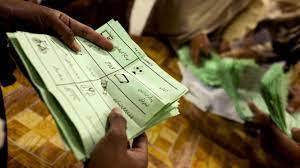
The Election Commission of Pakistan has announced February 8 2024 as the polling day for the general election but currently, Pakistan is facing many socio-economic issues such as low economic growth, rapid population growth, high political instability, high stagflation, climate changes, and low levels of foreign reverse.
This means without serious political reforms in Pakistan, this election will be like the previous elections; waste of resources, allegations of selection not an election, and status quo of socio-economic conditions of the people.
The major political parties of Pakistan need to understand the importance of political reforms. As there is no mutual political consensus and social capital between major political parties as a result this gap is filled by de facto institutions.
If we look at our history we can observe this behavior, such as in the journey of seventy-six years, more than thirty years have been directly ruled by military dictators, and none of the elected Prime ministers had completed their five years of tenure.
Similarly, the donation campaign for dam construction was initiated by the Supreme Court. Such examples clearly show the lack of political consensus in Pakistan and the filling of political gaps by non-political institutions.
Continuity and evaluation of policies are necessary for sustainable development. In the case of Pakistan, policies are also changed with the change of government. The lack of continuity of policies suggests political reforms in Pakistan.
In Pakistan, all political parties work according to their own agendas and interests which is not according to the needs of Pakistan.
In different political and non-political regimes, different policy frameworks were introduced in Pakistan such as during the 1960s Green Revolution, in the 1970s nationalism, in the 1980s de-nationalism and private-led growth, and in the 1990s neoliberalism.
All of the policies were introduced for a short period and as a result of the discontinuation of policies, they supplemented the socio-economics crisis of Pakistan. With the help of political reforms, all political parties can develop mutual strategies and policies for every sector of Pakistan and can also resolve the issue of discontinuity of policies.
The increasing problem of polarized society also calls for political reforms. In the last few years, our society has become a highly politically polarized society as a result every political party rejects the political legitimacy of each other and also limits the power of expression. Political reforms are the only way to reduce political polarization which can promote real democracy along with tolerance and acceptance of others.
As the mainstream politics always reflect and influence people’s lives. The deteriorating cultural, ethical, and morality of people also demand political reforms in Pakistan. Unethical language usually used by politicians in their conversations, now started by common people against their opponents. Like this leaking of personal videos, and commenting on personal life have also become in our society. Political reforms will help in reshaping the politics of Pakistan based upon tolerance and acceptance, and will also help in people's attitudes and behaviour.
For political reforms in Pakistan, all the major political parties need to understand and accept other existence. Without developing political consensus and social capital, reform is not possible in Pakistan. Like the character of democracy was signed between PPP and PML(N), all political parties should develop and sign a “Charter of Political Reforms”.
It is important to develop political consensus among all political parties for political reforms in Pakistan but before this, all parties need to consider other necessary steps. Among these are intra-party elections and the implementation of participatory governance framework.
These steps will be the first step for political reform in Pakistan as with the help of such an approach internal environment of a political party will become heterogeneous and the point of view of every spectrum of society can be considered. These methods will also help to eliminate of family and feudal-based political system in Pakistan.
As the general election is approaching and political parties complain about a level playing field, it is real-time in Pakistan for political reforms. Without political reforms, the result of the election will be controversial, and a new wave of protest will initiate. Only political reforms and consensus put Pakistan in the right direction.

